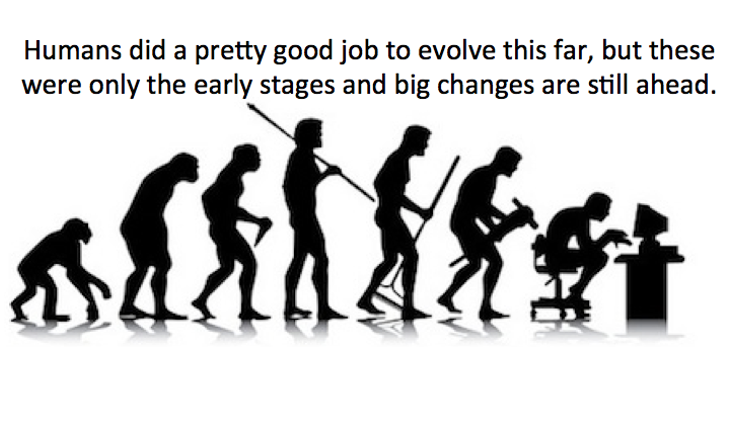Technical and Human Evolution
As I wrote in Moore’s Law and the Future of Healthcare,
“Futurists regularly consider alternative scenarios and look at factors that can steer the future in one direction or another. That way, clients can select a preferred version of the future and know what they might do to make that future happen.
It’s relatively easy to extrapolate past trends, assuming that nothing prevents those trends from continuing at the same rate, but will they? One can also look at what’s possible by tracking research lab activity and then estimating how long it will take to bring those new technologies to market.
But a potentially better approach is to start with a solid understanding of market NEEDS and what drives the development of solutions for them, or factors that inhibit solutions. Changes in politics and public policy, for example, can be a huge driver, with Obamacare as an example, or a huge inhibitor, such as with political corruption. That’s why I’m so interested in various healthcare reforms that accompany tech innovation.”
In the following video, see how future technologies could impact human longevity, Earth’s environment, and artificial intelligence.
Tech Evolution
As a retired IBM technologist who watched computer evolution for some 50 years, this video makes me think about the exponentially accelerating pace of tech innovation, which is already giving us medical devices that keep getting smaller, cheaper, more accurate, and easier to use. This simple trend is allowing many medical functions to move down-market from doctors in clinics and hospitals to consumers at home; and it’s disrupting traditional business models. That scares the hell out of those sitting at the top of the healthcare mountain and looking down at hungry competitors, because they know that to survive they must change. After all, nearly 90% of the original [1955] Fortune 500 companies are no longer in business today. I wonder if any will still be around in 50 years and think they’ll all be gone in 100.
It’s hard enough to envision the future five or ten years from now, but it’s much harder one hundred, or one thousand. So pause and reflect on the video you just watched, and then think of possible implications for:
- The Future of Health Care, Blending Science and Technology (INFO + NANO + BIO + NEURO)
- Blending Man and Machine (Artificial Intelligence, Augmented Reality, Virtual Reality, Prosthetics, and Implants)
- Sex and Social Interactions (The Internet and Social Media are just the beginning.)
- Transportation (on land, water, air, and space)
- Economics and Employment (What will humans do? What will work and play be like?)
- Demographic Shifts, Longevity, and Race
- What might we look like in the distant future?
Human Evolution
Here are Seven Next Steps in Human Evolution that may shape what we look like in 5,000, 10,000 or even 100,000 years, assuming we still exist as a species that far in the future.
Population Growth and Demographic Change
The World in 2050 is a BBC & National Geographic Documentary that examines the effects of having more than 9 billion people on the planet, consuming ever more resources and leading ever more technologically complex lives. For perspective, there were 2.5 billion people on Earth when I was born, but there are almost 8 billion here now.
The BBC documentary only looks about 30 years into the future but still asks some important questions. What will our cities be like? What and how will we eat? Will global warming trigger catastrophic changes, or will we be able to engineer our way out of the world climate crisis?
Predicting man’s future 1,000 years from now is nearly impossible. We might not even make it that far unless we address other serious questions, starting with how to evolve our political systems fast enough to make the necessary policy changes. The legislative process has been slowing down lately, thanks to our sharply divided politics, but the pace of tech innovation keeps accelerating… exponentially. That’s why I think politics is the most important issue facing humans today, and why I spend so much time now writing about healthcare policy.




